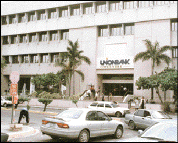
UnionBank A process of accounting for all of Union Bank's fixed assets and pricing the institution's $20 billion plus Government paper is delaying the long awaited sale of the merged bank to Royal Bank of Trinidad and Tobago (RBTT).
The sale of the bank was supposed to be finalised at the end of July. That date was pushed back to the end of August while Trinidad's second largest bank, RBTT planned to finance the deal by a debt issue of around US$100 million, some US$60 to US$70 million for use on the Jamaica purchase.
Union Bank acting managing director Brent Ciurlino speaking to the Financial Gleaner said: "There is a difference between having a deal on the table that is taking a little time to close as opposed to having no one at the table. We have 24 branches, the remnants of 4 commercial banks, 4 building societies, 3 merchant banks, micro financing and post office issues all to unravel before the bank becomes an entity fit for sale, but progress is being made."
Mr. Ciurlino further explained that both Union Bank and RBTT management teams were going through a re-valuation of the fixed assets with a view to establishing the right market value as set out in its June 30 audit. That audit is expected to be viewed as the sale audit.
Furthermore a review of human resource levels has to meet certain objectives required by RBTT.
The audit of June 30 revealed that Union Bank posted a $1 billion operating loss in the year to the end of December.
Mr. Ciurlino said: "We are currently undertaking a loan inventory process which will allow some loans to go to the Financial Sector Adjustment Company (FINSAC) and to keep a portfolio here. The question is whether RBTT will be comfortable with the risk on that portfolio.
"Then there are a couple of issues concerning our micro financing programme and our post office division operations. I do think the World Bank would rather not deal with our micro financing programme and Jamaica National Building Society is looking at acquiring that portfolio. Some people have deposit accounts tied into the micro financing programme which is part of an Inter Development Bank (IDB) supported project. This too is yet to be resolved.
"Our post office division has become a sensitive area. I don't think RBTT will want to be in the post office business. So without causing a trauma we have to find a home for it."
He stressed that the crux of the matter was an agreed upon conversion of FINSAC bonds on the bank's portfolio and how it was going to be paid. He said the bonds had a yield and that it was vitally important that it be pegged to some standard or index likely to be Treasury Bills because that's what the sovereign debt is issued under.
"It's hard for me to understand that a buyer would seek a premium other than Treasury Bills. My personal opinion is not to give an unfair income subsidy because the bank is making a profit which gives one a good footing to move forward. What you have to look at is how someone coming from another market would want to downplay the risk. My guess is that they would want to mitigate the risk by pegging it to some kind of premium. I'm hesitant to throw out a number but I am closer to Treasury Bills than any other instrument.
However, the major issue appears to be one of liquidity. "We have operated the bank for two years with no problems. So if you are coming in as a serious bank with liquidity in place it seems to me you can stay with the paradigm that's in the bank now," explained Mr. Cuirlino.
According to the acting managing director, raising the money is not the issue for RBTT rather it is having a stable deposit franchise in place for a period of time until the new managers can make loans and procure new customers, in other words return to core banking activities, but that's all down to the marketing of the bank.
Mr. Cuirlino added: "Union Bank has a good customer of base of 400,000. The bank is stabilised with debt systems and efficiency issues having been addressed. You have to get another player in to kick start growth by making loans and providing effective services. Other players in the financial sector do not appear that motivated - Bank of Nova Scotia (BNS) is not taking any new deposits, National Commercial Bank (NCB) has to be properly divested and both CIBC and Citibank are sitting tight," said Mr. Cuirlino.
By Al Edwards
Staff Reporter

















































